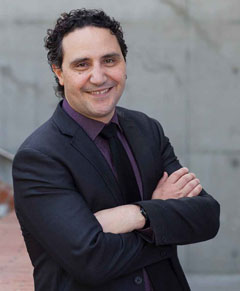March 13, 2020
Q&A with Fulbright Scholar James Arvanitakis
Submitted by Communications and Marketing

As part of the national Fulbright Scholar Program, K-State's Oz to Oz Fulbright Scholars highlights senior research scholars to build and develop international partnerships and friendships.
While the public presentation by James Arvanitakis, professor and pro vice chancellor of research and graduate studies at Western Sydney University, has been canceled, collaboration may still be a possibility.
This Q&A gives the university community an opportunity to learn more about the scholar speaker and reinforces the importance of mutual understanding and education of diverse research topics.
What is your field of study?
I am truly committed to cross-disciplinary study having undertaking research, teaching and publishing in sociology — including two successful textbooks — cultural studies, international relations, politics, art theory and philosophy. I also write about the future of education and how to make universities more inclusive — and fun. I currently have two broad areas of research: understanding contemporary political partisanship and how this can be overcome, and how we can rebuild trust in expert institutions.
How is the Fulbright scholarship helping you increase knowledge of this area?
Much of time with the Fulbright Fellowship is focused on understanding political partisanship and how this is undermining trust in politics and expert systems. I have been writing extensively about this and am organizing a new book. A collection of some of my writing can be found here. I am also learning a great deal from the students in my classes — I am running three seminar classes at the University of Wyoming.
What drives your interest in your research?
I grew up in a very working-class family — dad carried bricks and did manual labor, mum ironed for a living. My university education gave me opportunities that I never dreamt of and my parents could not believe; my passion for promoting education and research also stems from this very personal journey and I want others to share these opportunities. More specifically, I strongly believe that we as researchers and educators need to be on the frontline working towards a more just, inclusive and equitable society. It is not enough to engage in theory, but engage with people: understand their concerns, fears and hopes, and work with them to help solve their problems. This work can be messy; so much harder than sitting in your office writing papers. In the true spirit of land-grant universities, we need to ensure that we fulfill a social as well as an economic mission.
Since the Fulbright helps to build collaborative relationships, in what areas do you want to collaborate with American researchers?
I have been lucky enough to already collaborate with some local researchers here in Wyoming but am very keen to extend these collaborations. As noted, my focus here is the current political environment and how we can break the deadlock. I am keen to work with anyone in this broad area.
Why did you accept the invitation to visit K-State?
You can't talk about land-grant universities without mentioning Kansas State University's rich land-grant history — something I find inspiring and reminds of why universities were established. It has an international reputation of research excellence that I am keen to dive into as well as build connections with my home university in Australia.
Arvanitakis' K-State host is Laurie Johnson, professor of political science. Oz to Oz scholars usually speak with Eric Atkinson, host of Agriculture Today, which are posted on the K-State Research and Extension News page.
